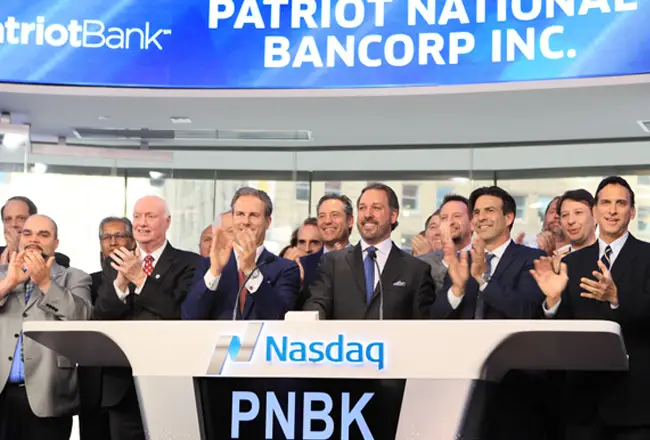Reinvigorated Patriot National Bank posts healthy revenues

For an institution that was once near the brink of collapse, Patriot National Bank has made an impressive comeback ”” and it”™s not done yet, according to chairman and CEO Michael Carrazza.
“The bank has never been as profitable as it is today,” Carrazza said at his office in Patriot”™s headquarters at 900 Bedford St. in Stamford. “We took an aggressive approach to turning it around and we will continue with that approach.”
Dividends have been coming fast and furious for Patriot over the past
several months.
In August, it posted second-quarter pretax income of $1.4 million and net income of $804,000. Those are significant increases over the year-ago quarter”™s pretax loss of $948,000 and net loss of $582,000. For the six months ended June 30, net income was $2.5 million, compared with $71,000 for the first half of 2016.
Total assets were $773 million as of June 30, essentially unchanged from the end of the first quarter, when they had increased by $18 million. Loans totaled $679 million as of June 30, up from the $631 million reported March 31, and up 28 percent from the $529 million reported June 30, 2016.
Those figures followed the banks reported first-quarter net income of $1.73 million, a 165 percent increase over the year-ago quarter, while first-quarter earnings increased over the prior quarter by 66 percent. Those results included the impact of a substantial recovery of a loan that was charged off
last year.
In July, the bank said it would begin making quarterly dividends for shareholders for the first time since 2008, and a month later it announced that it was acquiring Prime Bank, based in the town of Orange in New Haven County.
It has been an impressive turnaround for the institution, which was founded in 1999. Carrazza said it “was in terrible shape” when he entered the picture in 2010. A private equity investor by trade, he led the group PNBK Holdings ”” consisting largely of institutional investors ”” in injecting $50 million into the bank and taking an 87 percent stake in the company. Over the following few months, the bank divested itself of $140 million in assets, selling off problem loans, closing nearly a quarter of its 19-branch network and reducing its workforce by about 30 employees.
The bank today employs 115 people and has nine branches, including six in Fairfield County and two in Westchester.
Once given a rating of two stars out of five by independent bank analysis firm BauerFinancial ”” a categorization indicating a “problematic” bank ”” Patriot now has a four-star, or “excellent,” rating.
Carrazza said that putting the right executive team in place has been critical in Patriot”™s resurgence. Christopher Maher served as its president and CEO from Oct. 15, 2010 to March 18, 2013, when he resigned for “personal reasons.” He is now president of OceanFirst Financial Corp. and OceanFirst Bank, based in Toms River,
New Jersey.
Carrazza next brought Kenneth Neilson, the former chairman and CEO of Hudson United Bancorp, out of retirement to succeed Maher. In August of last year, Neilson and his wife, Susan, who was COO, resigned. That resulted in Carrazza becoming interim CEO and Peter Cureau serving as interim president and COO.
Despite the apparent suddenness of the Neilsons”™ departure, Carrazza said it had been planned from the start. “Ken took (Hudson United Bank, where he had previously been president/CEO) from half-a-billion in assets to $9 billion,” he noted in explaining why Patriot had hired him. “But he was working here on 12-month contracts. He planned to be here for a year, which turned out to be three-and-a-half. We both agreed that the time was right for him to move on.”
Carrazza said he still considers himself to be “interim,” but allowed that he expects to keep the CEO title “until my work
is done here.”
“This is the first time (in my career) that I have dropped down to directly oversee operations and management,” he said. “I have the right skill set to do that.” To cede the post in the midst of the bank”™s current activity “would be incredibly disruptive,” the New York City resident said.
In February, Richard Muskus Jr. was promoted from executive vice president and chief lending officer to president, with Cureau returning his full attention to his consulting firm PD Cureau Advisors.
“Rick and I work hand-in-glove,” Carrazza said of Muskus. “He”™s a strong banker who was the perfect pick. He knows the landscape, while I work on the bank”™s vision and strategy. We”™re a very powerful tag team.”
While he”™s open to other acquisition opportunities such as the Prime Bank deal, Carrazza said he and the bank remain focused on customers ”” while occasionally taking a moment to bask in what has been achieved over the past few years.
“No bank has ever had the kind of bad metrics we did and survived on its own,” he said. “We went through every loan we had with a microscope and really did a forensic analysis of everything we were doing and what we should be doing. It was a matter of going back to walking instead of running. And we plan to keep doing that.”